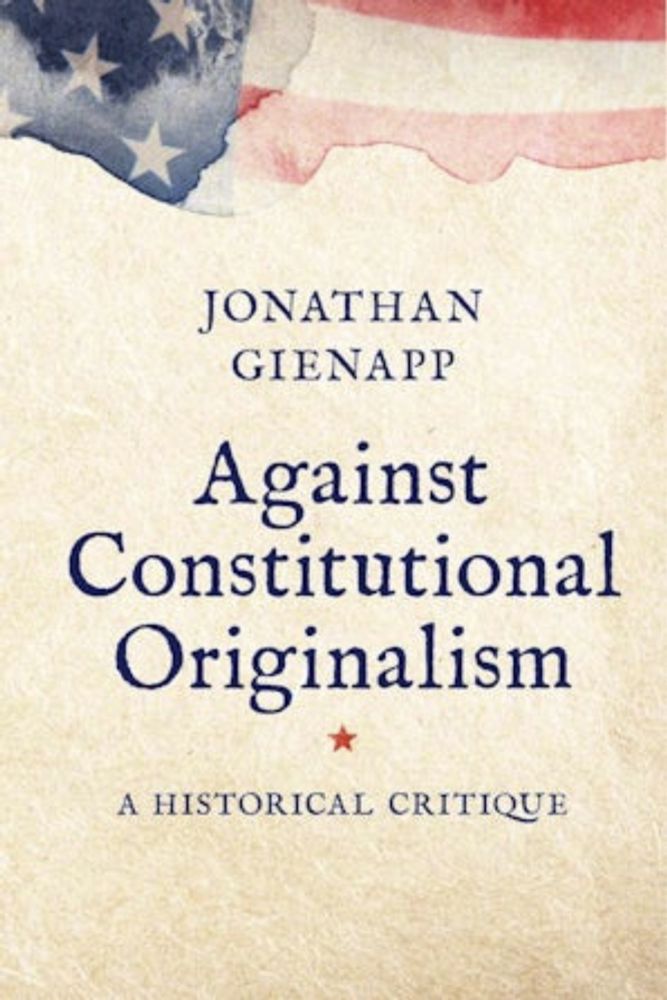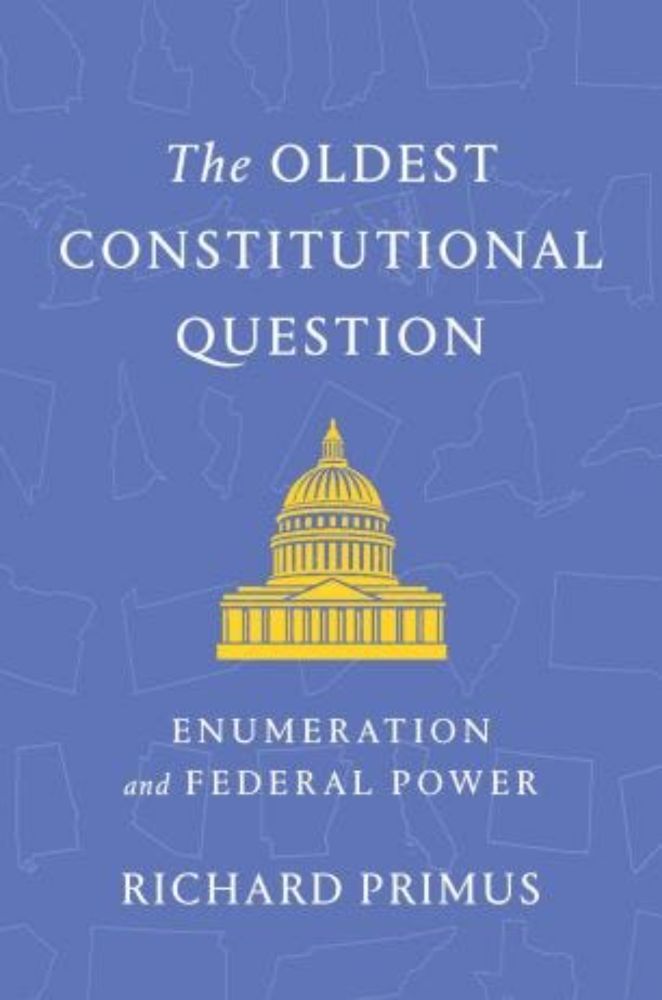
Jonathan Gienapp
@jgienapp.bsky.social
Professor of History and Law, Stanford University. Books on early Constitution: http://tinyurl.com/yynk95aa; and originalism and history: http://tinyurl.com/3dd5hnt6
jonathangienapp.com
jonathangienapp.com
Pinned
Jonathan Gienapp
@jgienapp.bsky.social
· Feb 25

Against Constitutional Originalism: A Historical Critique (Yale Law Library Series in Legal History and Reference)
Against Constitutional Originalism: A Historical Critique (Yale Law Library Series in Legal History and Reference) [Gienapp, Jonathan] on Amazon.com. *FREE* shipping on qualifying offers. Against Constitutional Originalism: A Historical Critique (Yale Law Library Series in Legal History and Reference)
www.amazon.com
Now that I am on here, a thread collecting events, discussions, interviews, and reviews connected to my new book, *Against Constitutional Originalism: A Historical Critique*, published by Yale University Press @yalepress.bsky.social.
www.amazon.com/Against-Cons...
www.amazon.com/Against-Cons...
New Symposium on my book is out in *American Political Thought*.
Featuring critical essays by James Stoner, Michael McConnell, Calvin TerBeek, and George Thomas.
Followed by my response.
www.journals.uchicago.edu/toc/apt/2025...
Featuring critical essays by James Stoner, Michael McConnell, Calvin TerBeek, and George Thomas.
Followed by my response.
www.journals.uchicago.edu/toc/apt/2025...

October 28, 2025 at 8:54 PM
New Symposium on my book is out in *American Political Thought*.
Featuring critical essays by James Stoner, Michael McConnell, Calvin TerBeek, and George Thomas.
Followed by my response.
www.journals.uchicago.edu/toc/apt/2025...
Featuring critical essays by James Stoner, Michael McConnell, Calvin TerBeek, and George Thomas.
Followed by my response.
www.journals.uchicago.edu/toc/apt/2025...
Reposted by Jonathan Gienapp
Rejecting the Unitary Executive is out in the Utah Law Review! TY @blakeprof.bsky.social @thisyank.bsky.social @jgienapp.bsky.social @andreascoseriakatz.bsky.social @jdmortenson.bsky.social @jedshug.bsky.social
@narosenblum.bsky.social
& many others not on here
dc.law.utah.edu/ulr/vol2025/...
@narosenblum.bsky.social
& many others not on here
dc.law.utah.edu/ulr/vol2025/...
Rejecting the Unitary Executive
Critics have dismissed originalism as an empty methodology. They claim it is incapable of resolving our most important constitutional disputes, including the debate over the unitary executive. While u...
dc.law.utah.edu
October 22, 2025 at 3:21 PM
Rejecting the Unitary Executive is out in the Utah Law Review! TY @blakeprof.bsky.social @thisyank.bsky.social @jgienapp.bsky.social @andreascoseriakatz.bsky.social @jdmortenson.bsky.social @jedshug.bsky.social
@narosenblum.bsky.social
& many others not on here
dc.law.utah.edu/ulr/vol2025/...
@narosenblum.bsky.social
& many others not on here
dc.law.utah.edu/ulr/vol2025/...
Reposted by Jonathan Gienapp
My brilliant colleague Kate Haulman's new book is out today: The Mother of Washington in Nineteenth-Century America (Oxford, 2025). I'm obviously biased but it is really exquisite!
global.oup.com/academic/pro...
global.oup.com/academic/pro...
global.oup.com
September 12, 2025 at 2:01 AM
My brilliant colleague Kate Haulman's new book is out today: The Mother of Washington in Nineteenth-Century America (Oxford, 2025). I'm obviously biased but it is really exquisite!
global.oup.com/academic/pro...
global.oup.com/academic/pro...
Reposted by Jonathan Gienapp
When it addresses what history is most useful (founding-era) it raises an interesting q about Bruen's emphasis on *text*. Tho the court doesn't cite @jgienapp.bsky.social or Jud Campbell's work about the limited relevance of textual specification, that seems to be in the background of this worry.

August 27, 2025 at 4:53 PM
When it addresses what history is most useful (founding-era) it raises an interesting q about Bruen's emphasis on *text*. Tho the court doesn't cite @jgienapp.bsky.social or Jud Campbell's work about the limited relevance of textual specification, that seems to be in the background of this worry.
Reposted by Jonathan Gienapp
If you're interested in constitutional governance (in this case US governance), I can strongly recommend this book from @jgienapp.bsky.social. Wonderfully lucid. And, as a (very) lay reader, I appreciated the reiterated arguments and the plain, pithy prose.

August 23, 2025 at 8:44 AM
If you're interested in constitutional governance (in this case US governance), I can strongly recommend this book from @jgienapp.bsky.social. Wonderfully lucid. And, as a (very) lay reader, I appreciated the reiterated arguments and the plain, pithy prose.
Reposted by Jonathan Gienapp
7) In his new book @jgienapp.bsky.social argues that one cannot understand the Constitution without placing it into the contexts in which it was written-- none more so than the Founders' commitment to republicanism.

Against Constitutional Originalism
A detailed and compelling examination of how the legal theory of originalism ignores and distorts the very constitutional history from which it derives inter...
yalebooks.yale.edu
August 22, 2025 at 3:36 PM
7) In his new book @jgienapp.bsky.social argues that one cannot understand the Constitution without placing it into the contexts in which it was written-- none more so than the Founders' commitment to republicanism.
Reposted by Jonathan Gienapp
directly in the face of recent historical scholarship by Jud Campbell, @jgienapp.bsky.social, and others, that demonstrates how rights at the founding were not conceived of as these textual objects only secured once codified in a constitution.
August 20, 2025 at 2:02 PM
directly in the face of recent historical scholarship by Jud Campbell, @jgienapp.bsky.social, and others, that demonstrates how rights at the founding were not conceived of as these textual objects only secured once codified in a constitution.
Reposted by Jonathan Gienapp
📣 Catch OAH speakers Jonathan Gienapp & Stephanie E. Jones-Rogers in Sept at San Francisco St Univ! They'll be speaking Sept. 17 & 18 for SFSU’s Constitution & Citizenship Day Conference. #OAHLecturer
📅 history.sfsu.edu/constitution...
🎤 Bring a speaker to your campus! www.oah.org/lectures/upc...
📅 history.sfsu.edu/constitution...
🎤 Bring a speaker to your campus! www.oah.org/lectures/upc...


July 23, 2025 at 8:07 PM
📣 Catch OAH speakers Jonathan Gienapp & Stephanie E. Jones-Rogers in Sept at San Francisco St Univ! They'll be speaking Sept. 17 & 18 for SFSU’s Constitution & Citizenship Day Conference. #OAHLecturer
📅 history.sfsu.edu/constitution...
🎤 Bring a speaker to your campus! www.oah.org/lectures/upc...
📅 history.sfsu.edu/constitution...
🎤 Bring a speaker to your campus! www.oah.org/lectures/upc...
Reposted by Jonathan Gienapp
It’s been a hell of a run. Being Editor of @lawandhistrev.bsky.social has been the greatest honor of my career. But it had to end some time. I’ll be stepping down as Editor by next summer. I’ll give proper thanks to LHR’s Associate Editors & ASLH folks in due course. What a bittersweet moment!
August 7, 2025 at 1:49 PM
It’s been a hell of a run. Being Editor of @lawandhistrev.bsky.social has been the greatest honor of my career. But it had to end some time. I’ll be stepping down as Editor by next summer. I’ll give proper thanks to LHR’s Associate Editors & ASLH folks in due course. What a bittersweet moment!
Reposted by Jonathan Gienapp
Today the Balkinization blog features my reflections at the end of its seven-scholar symposium on my new book The Oldest Constitutional Question: Enumeration and Federal Power. You can find my short essay at the link below.
Many thanks to the participants.
balkin.blogspot.com/2025/07/grat...
Many thanks to the participants.
balkin.blogspot.com/2025/07/grat...
Balkinization: Gratitude, and a Reply in Two Parts
A group blog on constitutional law, theory, and politics
balkin.blogspot.com
July 25, 2025 at 3:21 PM
Today the Balkinization blog features my reflections at the end of its seven-scholar symposium on my new book The Oldest Constitutional Question: Enumeration and Federal Power. You can find my short essay at the link below.
Many thanks to the participants.
balkin.blogspot.com/2025/07/grat...
Many thanks to the participants.
balkin.blogspot.com/2025/07/grat...
Reposted by Jonathan Gienapp
🚨Tuesday, Aug. 5 — Everything you need to know about the "Unitary Executive Theory" that's underwriting our new era of presidential lawlessness.
RSVP today 👇🏻 to get the link: brennan.swoogo.com/unitaryexecu...
@brennancenter.org @janemanners.bsky.social @jdmortenson.bsky.social @wuc3.bsky.social
RSVP today 👇🏻 to get the link: brennan.swoogo.com/unitaryexecu...
@brennancenter.org @janemanners.bsky.social @jdmortenson.bsky.social @wuc3.bsky.social

The Rise of the Imperial Presidency
The once-obscure idea of a unitary executive is now central to debates over presidential power.
brennan.swoogo.com
July 25, 2025 at 7:13 PM
🚨Tuesday, Aug. 5 — Everything you need to know about the "Unitary Executive Theory" that's underwriting our new era of presidential lawlessness.
RSVP today 👇🏻 to get the link: brennan.swoogo.com/unitaryexecu...
@brennancenter.org @janemanners.bsky.social @jdmortenson.bsky.social @wuc3.bsky.social
RSVP today 👇🏻 to get the link: brennan.swoogo.com/unitaryexecu...
@brennancenter.org @janemanners.bsky.social @jdmortenson.bsky.social @wuc3.bsky.social
Reposted by Jonathan Gienapp
Reposted by Jonathan Gienapp
So thrilled to see @jgienapp.bsky.social's important book on this phenomenal list! Congrats to all! 🎉
Honored that my book is on the longlist for this year’s Cundill History Prize.
www.cundillprize.com/news/the-202...
www.cundillprize.com/news/the-202...

The 2025 Cundill History Prize Longlist | Cundill Prize
The jurors have chosen 15 exceptional titles to be longlisted for the 2025 Cundill History Prize.
www.cundillprize.com
July 28, 2025 at 4:27 PM
So thrilled to see @jgienapp.bsky.social's important book on this phenomenal list! Congrats to all! 🎉
Reposted by Jonathan Gienapp
A very informative book. Well-deserved recognition.
Honored that my book is on the longlist for this year’s Cundill History Prize.
www.cundillprize.com/news/the-202...
www.cundillprize.com/news/the-202...

The 2025 Cundill History Prize Longlist | Cundill Prize
The jurors have chosen 15 exceptional titles to be longlisted for the 2025 Cundill History Prize.
www.cundillprize.com
July 28, 2025 at 4:22 PM
A very informative book. Well-deserved recognition.
Honored that my book is on the longlist for this year’s Cundill History Prize.
www.cundillprize.com/news/the-202...
www.cundillprize.com/news/the-202...

The 2025 Cundill History Prize Longlist | Cundill Prize
The jurors have chosen 15 exceptional titles to be longlisted for the 2025 Cundill History Prize.
www.cundillprize.com
July 28, 2025 at 4:18 PM
Honored that my book is on the longlist for this year’s Cundill History Prize.
www.cundillprize.com/news/the-202...
www.cundillprize.com/news/the-202...
Reposted by Jonathan Gienapp
Interesting how originalists try to avoid historians' critiques. This, to me, is no more persuasive than the others. 'History' is what happened & our interpretations of it--you can't have a law of the past that isn't fundamentally yoked to trying to get that right.
papers.ssrn.com/sol3/papers....
papers.ssrn.com/sol3/papers....
Does Good Originalism Need Good History?
One might think that originalism by definition is largely about history. After all, what does it mean to be "originalist" if not to be concerned prima
papers.ssrn.com
July 23, 2025 at 3:57 PM
Interesting how originalists try to avoid historians' critiques. This, to me, is no more persuasive than the others. 'History' is what happened & our interpretations of it--you can't have a law of the past that isn't fundamentally yoked to trying to get that right.
papers.ssrn.com/sol3/papers....
papers.ssrn.com/sol3/papers....
Reposted by Jonathan Gienapp
The final contribution to the Balkinization symposium on my new book *The Oldest Constitutional Question* is by Prof. John Mikhail of Georgetown. You can find it here:
balkin.blogspot.com/2025/07/why-...
@johnmikhail.bsky.social
Sometime soon, I'll post a response to all the symposium essays.
balkin.blogspot.com/2025/07/why-...
@johnmikhail.bsky.social
Sometime soon, I'll post a response to all the symposium essays.
Balkinization: Why Did the Framers Enumerate Congressional Powers?
A group blog on constitutional law, theory, and politics
balkin.blogspot.com
July 21, 2025 at 12:51 AM
The final contribution to the Balkinization symposium on my new book *The Oldest Constitutional Question* is by Prof. John Mikhail of Georgetown. You can find it here:
balkin.blogspot.com/2025/07/why-...
@johnmikhail.bsky.social
Sometime soon, I'll post a response to all the symposium essays.
balkin.blogspot.com/2025/07/why-...
@johnmikhail.bsky.social
Sometime soon, I'll post a response to all the symposium essays.
Reposted by Jonathan Gienapp
Brilliant essay by @jgienapp.bsky.social on Primus’s new book. balkin.blogspot.com/2025/07/the-...
The Many Meanings of Enumeration
For the Balkinization Symposium on Richard Primus, The Oldest Constitutional Question: Enumeration and Federal Power (Harvard University ...
balkin.blogspot.com
July 13, 2025 at 3:55 AM
Brilliant essay by @jgienapp.bsky.social on Primus’s new book. balkin.blogspot.com/2025/07/the-...
Reposted by Jonathan Gienapp
Today's contribution to the Balkinization symposium on my new book, The Oldest Constitutional Question, is by Penn's William Ewald, who writes about contrasts with the British and German constitutional systems. You can find Professor Ewald's essay here:
balkin.blogspot.com/2025/07/does...
balkin.blogspot.com/2025/07/does...
Balkinization: Does Anybody Else Suffer from Enumerationism?
A group blog on constitutional law, theory, and politics
balkin.blogspot.com
July 12, 2025 at 3:18 PM
Today's contribution to the Balkinization symposium on my new book, The Oldest Constitutional Question, is by Penn's William Ewald, who writes about contrasts with the British and German constitutional systems. You can find Professor Ewald's essay here:
balkin.blogspot.com/2025/07/does...
balkin.blogspot.com/2025/07/does...
Reposted by Jonathan Gienapp
The Balkinization blog has now posted commentary from Prof. Sandy Levinson (of the University of Texas) about my new book, The Oldest Constitutional Question. You can find Levinson's commentary at the link below.
balkin.blogspot.com/2025/07/will...
balkin.blogspot.com/2025/07/will...
Balkinization: Will Richard Primus Get the Readership He Deserves (and the Country Needs)?
A group blog on constitutional law, theory, and politics
balkin.blogspot.com
July 10, 2025 at 5:02 PM
The Balkinization blog has now posted commentary from Prof. Sandy Levinson (of the University of Texas) about my new book, The Oldest Constitutional Question. You can find Levinson's commentary at the link below.
balkin.blogspot.com/2025/07/will...
balkin.blogspot.com/2025/07/will...
Reposted by Jonathan Gienapp
This week on the Balkinization blog, several excellent scholars will post essays reacting to my new book about enumerated powers. I'm honored by their engagement.
The first essay, by Prof. Christina Ponsa-Kraus of Columbia, is linked below.
open.substack.com/pub/richardp...
The first essay, by Prof. Christina Ponsa-Kraus of Columbia, is linked below.
open.substack.com/pub/richardp...

Symposium on Enumerated Powers
Christina D. Ponsa-Kraus reviews my book
open.substack.com
July 9, 2025 at 7:46 PM
This week on the Balkinization blog, several excellent scholars will post essays reacting to my new book about enumerated powers. I'm honored by their engagement.
The first essay, by Prof. Christina Ponsa-Kraus of Columbia, is linked below.
open.substack.com/pub/richardp...
The first essay, by Prof. Christina Ponsa-Kraus of Columbia, is linked below.
open.substack.com/pub/richardp...



